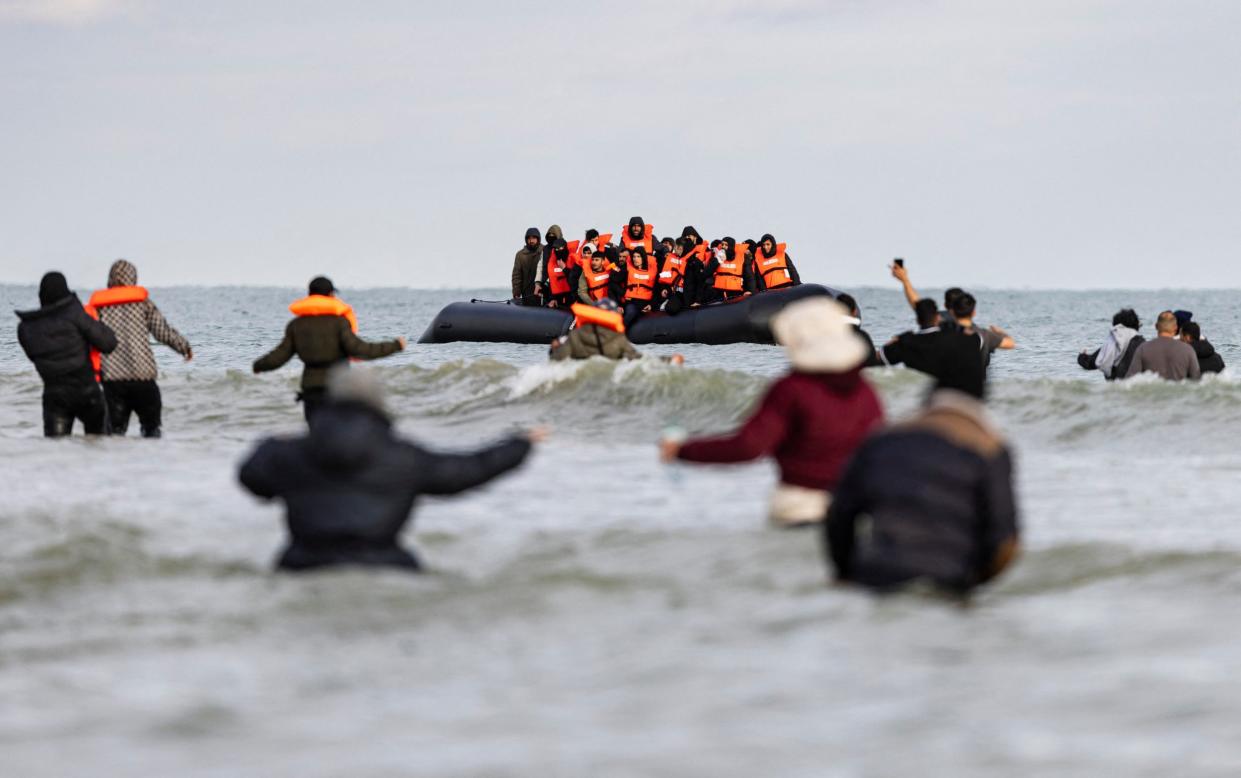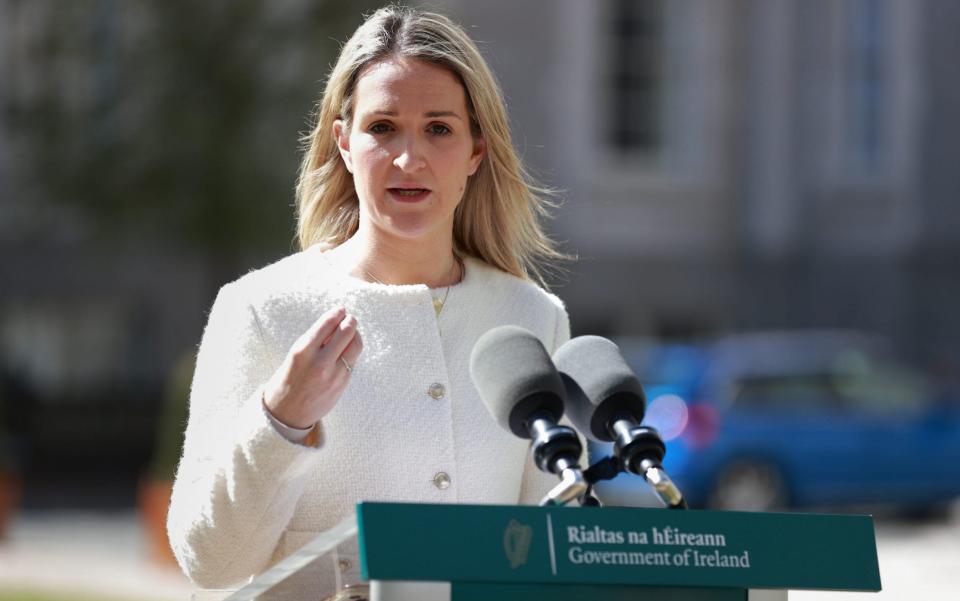UK attacks EU double standards on migrants

The Government has accused the EU of double standards after Ireland vowed to send asylum seekers to the UK despite France refusing to take Channel migrants back.
The row erupted after senior Irish ministers said they would draft emergency laws to send back refugees who had arrived from the UK to avoid being deported to Rwanda.
However, Tory ministers consider the proposal a “non-starter” because they are unable to send asylum seekers who arrive on small boats across the Channel back to France.
A UK government source said: “We won’t accept any asylum returns from the EU via Ireland until the EU accepts that we can send them back to France. We are fully focused on operationalising our Rwanda scheme, and will continue working with the French to stop the boats from crossing the Channel.”
Last night, the Daily Mail reported that international students, workers and visitors are claiming asylum in an attempt to remain in the UK by the back door.
Figures obtained by the newspaper showed a record 21,525 asylum claims were made by visa holders in the year to March 2023, which represents a 154 per cent annual rise.
On Monday, the Home Office will start detaining asylum seekers to be deported to Rwanda, with the Government hoping that the first flights will take off in the summer.
It comes amid record numbers of migrants crossing the Channel before the end of April, with Home Office figures on Sunday showing the highest total of arrivals by that point to date.
Last week, Lord Cameron, the Foreign Secretary, indicated that a migrant returns agreement with France to help break up smuggling gangs and stop people making the perilous journey across the Channel was “simply not possible” after Brexit.
He said “the situation we’re in” meant a deal to send migrants back to France when they landed in Britain, in place when he was Prime Minister, could not be replicated.
Last week, Micheal Martin, the Irish deputy prime minister, said the UK’s Rwanda policy was “impacting on Ireland” because people were “fearful” of staying in the UK and were seeking asylum in Ireland instead.
Following his comments, Helen McEntee, the Irish justice minister, discussed the plan to send asylum seekers back to the UK on RTE, the national broadcaster, on Sunday.
Simon Harris, the Irish prime minister, has asked that the proposals to be brought to his cabinet this week as he faces growing public pressure over rising migration figures.
Ms McEntee said: “My focus as minister for justice is making sure that we have an effective immigration structure and system.
“That’s why I’m introducing fast processing. That’s why I’ll have emergency legislation at cabinet this week to make sure that we can effectively return people to the UK, and that’s why I’ll be meeting the Home Secretary [James Cleverly] to raise these issues on Monday.”
However, Mr Cleverly has cancelled the meeting, saying he had a diary clash. Chris Heaton-Harris, the Northern Ireland Secretary, is expected to meet senior Irish officials on Monday and make the Government’s position clear.
Mr Heaton-Harris, who once chaired the European Research Group of Brexiteer Tory MPs, is meeting Mr Martin and Ms McEntee at the British-Irish Intergovernmental Conference in London. Lord Caine and Steve Baker, two other Northern Ireland ministers, are also attending.

The new call for a tougher return agreement has triggered a backlash from some Tories.
David Jones, a Tory MP and former Cabinet minister, said: “If they send them back, they will go back again because there is an open border. The Irish cannot have their cake and eat it. They wanted an open border, and they have an open border.
“What it does underline is the effectiveness of the Rwanda policy. Clearly, people are pre-empting that by moving to Ireland. As far as I can see, the Irish government doesn’t know how to address it. I don’t think they ever foresaw a situation like this would arise.”
Immigration to Ireland rose by 32 per cent in the year ending last April, with asylum seekers accounting for more than 13,000 of over 140,000 arrivals.
The influx comes amid a shortfall of Irish homes and huge rents, with a poll by the Business Post/Red C finding last year that 74 per cent of Irish voters believed the country had taken in “too many refugees”.
Mr Harris said on Sunday: “Every country is entitled to have its own migration policy, but I certainly don’t intend to allow anybody else’s migration policy to affect the integrity of our own one. This country will not, in any way, shape or form, provide a loophole for anybody else’s migration challenges. That’s very clear.”
Before Brexit, the return of migrants to EU countries was governed by the Dublin Agreement, under which migrants could be sent back to a safe third country through which they had passed before arriving at their destination.
This meant asylum seekers arriving in Ireland from the UK, or migrants reaching the UK from France could be returned if it could be shown that they had passed through a safe third country – that is, the UK or France.
But the UK left the scheme when it departed the EU and no successor agreement was signed during the Brexit talks, meaning there are no formal returns agreements in place between EU countries and the UK.
A post-Brexit provision was, however, made in the case of the UK and Ireland, which meant Ireland could return asylum seekers to Britain. No asylum seeker has been successfully returned to Ireland, or vice-versa, under this post-Brexit arrangement since it was struck.
However, the Irish High Court last month ruled that the Irish government’s declaration of the UK as a “safe third country” to which it could return asylum seekers was unlawful, owing to the Rwanda Bill. The emergency legislation proposal seeks to overturn this judgment.
Any returns agreement would face the challenge of how it would work, as asylum seekers returned to the UK could simply walk back into Ireland over the land border with Northern Ireland.
The issue is becoming increasingly contentious as Mr Sunak stakes his political credibility on stopping small boats from crossing the Channel.
On Sunday, he said the influx of migrants travelling to Ireland from the UK showed that the Rwanda scheme was already working as a deterrent, telling Sky News: “If people come to our country illegally but know that they won’t be able to stay there, they are much less likely to come – and that’s why the Rwanda scheme is so important.”
Meanwhile, on Monday the Home Office will launch a nationwide operation to detain asylum seekers for deportation to Rwanda. Immigration teams are primed to pick up people earmarked for deportation and detain those who turn up for routine check-ins at Home Office asylum centres.
They will be transferred to immigration detention centres, where Mr Sunak said last week that 2,200 spaces have been allocated for migrants to be held before deportation.
The moves came as Home Office figures showed that the number of migrants crossing the Channel had passed 7,000 before the end of April for the first time.
Despite the deaths of five migrants last Tuesday, some 359 people arrived on eight boats on Saturday, taking the total for the year so far to 7,167. That is a quarter up on the same date last year, when 5,745 had crossed by April 27, and seven per cent higher than 2022, when the number was 6,691.
Last week, Mr Sunak said the first flights to Rwanda would take off in “10 to 12 weeks” after securing parliamentary backing for the Safety of Rwanda Act, legalising the flights and the ratification of a new treaty with the country.

